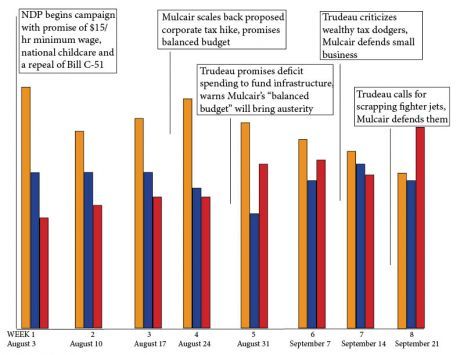What we think
You are here
Don’t let Liberals capture anti-Harper sentiment

September 24, 2015
The start of the federal election saw the NDP in a clear lead, campaigning to raise the minimum wage, provide national childcare and end the secret police Bill C-51. But now the Liberals are in the lead, pretending to be anti-austerity and anti-war. With a few weeks left there’s still time to expose the Liberals, but the NDP leadership will have to return to the party's roots.
Trudeau’s left tack
October 19 is the 42nd Canadian general election, and for the previous 41 the Conservatives and Liberals have taken turns colonizing Indigenous territories, launching imperialist wars, and attacking the 99% for the benefit of the 1%. From the 35th to the 37th Parliaments, the Liberal majority under Chrétien imposed the biggest cuts to social services in Canadian history. The 38th to 39th Parliaments were minority governments where the Tories and Liberals took turns propping each other up while extending the war in Afghanistan, and in the last Parliament Trudeau supported Harper’s Bill C-51.
For 41 consecutive elections Parliament has been dominated by the corporate Liberals or corporate Conservatives, and the 42nd Parliament has the chance of being the first federal victory for the NDP—the only party associated with the labour movement. But with NDP leader Tom Mulcair promising “balanced budgets,” and defending small businesses and fighter jets, Liberal leader Justin Trudeau is capturing the anti-Harper sentiment and pretending to be the anti-austerity candidate. Mulcair is risking the election by trying to look like the old discredited Liberals.
Orange Wave rises and recedes
The NDP began the election with a large lead, reflecting movements for $15/hr minimum wage, national childcare and the opposition to Bill C-51. The Liberals, having tied themselves to Harper’s secret police bill, were in a well-deserved last place, and calls for “strategic voting” had faded. As socialist.ca argued at the start of the election campaign, “To sustain the NDP through a long campaign and to mobilize people at the polls the party will need to articulate a clear alternative to Harper’s agenda of austerity, war and climate chaos.”
Resistance movements have articulated clear demands that the NDP could have campaigned on during the election and beyond. A campaign of promising to deal with climate change, a plan to end austerity, and plans to stop Canada's endless wars would have had enormous appeal in this election. But the NDP leadership has turned its back on its supporters and campaigned to the right, focusing instead on reassuring Bay Street it could manage Canadian capitalism.
The Palestine solidarity movement has challenged Harper’s militarism, but Mulcair silenced his pro-Palestine candidates and defended fighter jets. The climate justice movement has challenged pipelines from coast to coast but Mulcair still supports the tar sands and Energy East. Black Lives Matter have challenged police brutality but Mulcair has promised thousands more police.
Not only does this sacrifice principles, but it has also eroded the NDP’s lead in the polls. As Rosa Luxemburg warned more than a century ago: “Opportunism is a political game which can be lost in two ways: not only basic principles but also practical success may be forfeited. The assumption that one can achieve the greatest number of successes by making concessions rests on a complete error. Here, as in all great matters, the most cunning persons are not the most intelligent.” That’s why those on the left who have challenged Mulcair’s shortcomings are right: not only to defend basic principles, but to warn against electoral defeat.
Déjà vu?
The NDP has a record of abandoning the things that make them popular when it looks like they might win. In Ontario the NDP refused to support the campaign to raise the minimum wage, allowing the Liberals to capture the anti-Conservative sentiment and then impose austerity. In Toronto Olivia Chow campaigned to the centre, allowing John Tory to pretend to be an alternative to Rob Ford, and the impose austerity. Now the federal NDP are allowing Justin Trudeau to fill the vacuum and monopolize the anti-Harper mood—and now that the polling numbers have narrowed, the pro-Liberal “strategic voting” arguments will return, further threatening the NDP. In addition, agreeing to low corporate taxes, "balanced budget", pipelines, police and fighter jets is breathing new life into the Tories, who are rising in the polls and could win again.
This is unfolding at the same time as Jeremy Corbyn and Bernie Sanders campaigns are showing the mass audience that exists for progressive change. The same mood exists in Canada, as can be seen from the Leap Manifesto. Voters shouldn't be fooled by the Liberals, and should vote against the twin parties of corporate Canada and for the only party associated with the labour movement--while building the movements that can push it left and challenge it if it wins. But for the NDP to regain their lead, they need to return to how the election began: echoing movement demands and exposing the Liberal’s support for Harper’s austerity, war and climate chaos.
If you like this article, join the conferences Rage Against the System, September 26 in Vancouver and Toronto.
Section:










